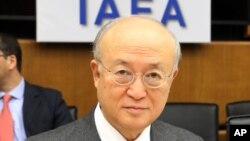The United Nations nuclear watchdog chief says Iran has cut its stock of higher-enriched uranium that is closest to atomic weapons-grade.
The head of the International Atomic Energy Agency, Yukiya Amano, said Monday that Iran had "reached the halfway mark" in efforts to dilute half its 20 percent-enriched uranium to a lower grade suitable for use as reactor fuel.
Under an interim deal with the six world powers, the other half of the uranium is to be changed into a form that is relatively difficult to reconvert to 20 percent.
Uranium enriched to 20 percent is only a technical step away from the 90-percent level needed for weapons.
The IAEA has a pivotal role in checking that Iran is living up to its part of the six-month accord in curbing its disputed nuclear program in exchange for some easing of sanctions that have impaired its oil-dependent economy.
The deal, reached last year in Geneva, was designed to buy time for negotiations on a final settlement of the decade-old stand-off over nuclear activity that Iran says is peaceful but the West fears may be aimed at developing a nuclear bomb capability.
Expert-level talks between the sides are to be held in Vienna March 5-7.
In return for implementing the agreement, Iran is gradually winning access to $4.2 billion of its oil revenues frozen abroad and some other sanctions relief.
The funds will be paid out in eight transfers on a schedule that started with a $550 million payment by Japan on February 1. Last month, banking sources said South Korea was set to make two payments in March totaling $1 billion.
Some information for this report was provided by AP and Reuters.
The head of the International Atomic Energy Agency, Yukiya Amano, said Monday that Iran had "reached the halfway mark" in efforts to dilute half its 20 percent-enriched uranium to a lower grade suitable for use as reactor fuel.
Under an interim deal with the six world powers, the other half of the uranium is to be changed into a form that is relatively difficult to reconvert to 20 percent.
Uranium enriched to 20 percent is only a technical step away from the 90-percent level needed for weapons.
The IAEA has a pivotal role in checking that Iran is living up to its part of the six-month accord in curbing its disputed nuclear program in exchange for some easing of sanctions that have impaired its oil-dependent economy.
The deal, reached last year in Geneva, was designed to buy time for negotiations on a final settlement of the decade-old stand-off over nuclear activity that Iran says is peaceful but the West fears may be aimed at developing a nuclear bomb capability.
Expert-level talks between the sides are to be held in Vienna March 5-7.
In return for implementing the agreement, Iran is gradually winning access to $4.2 billion of its oil revenues frozen abroad and some other sanctions relief.
The funds will be paid out in eight transfers on a schedule that started with a $550 million payment by Japan on February 1. Last month, banking sources said South Korea was set to make two payments in March totaling $1 billion.
Some information for this report was provided by AP and Reuters.





